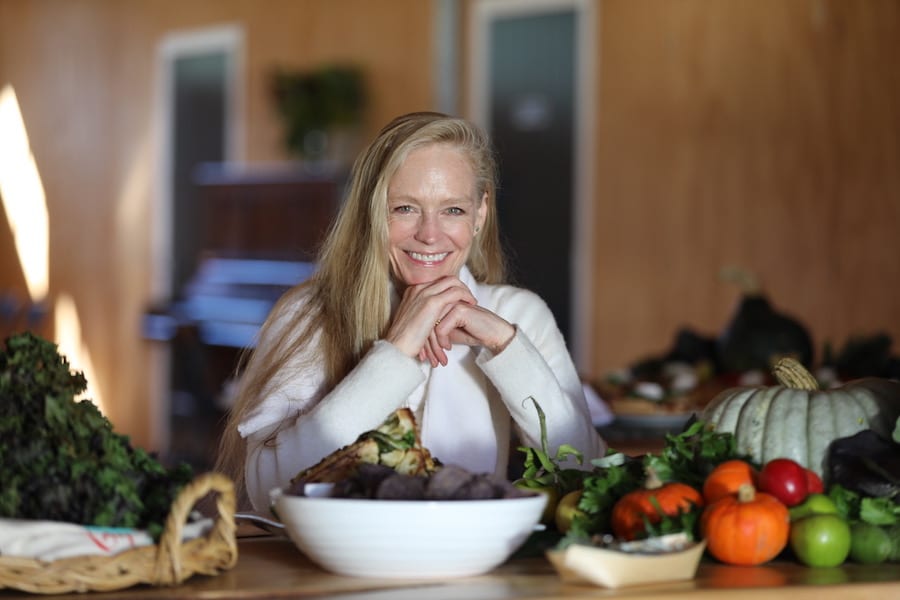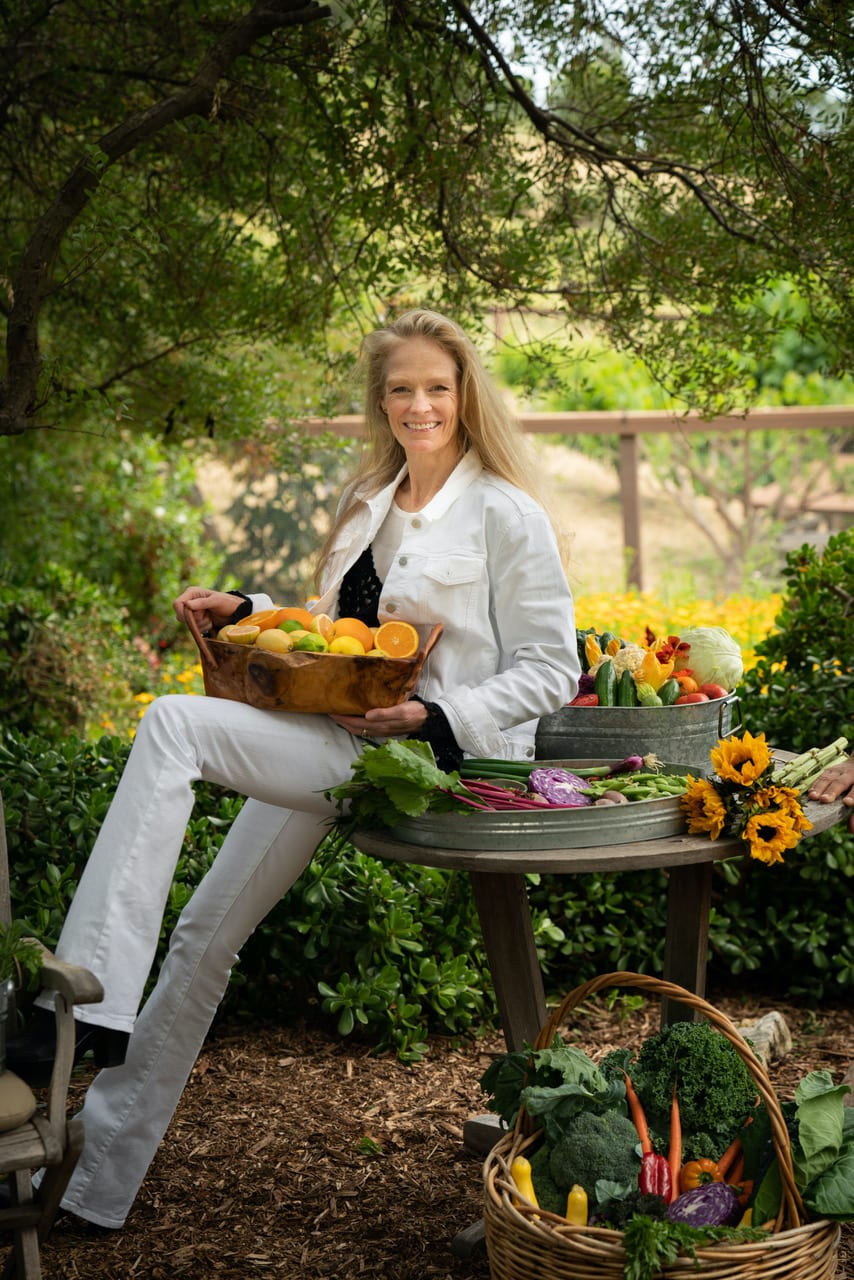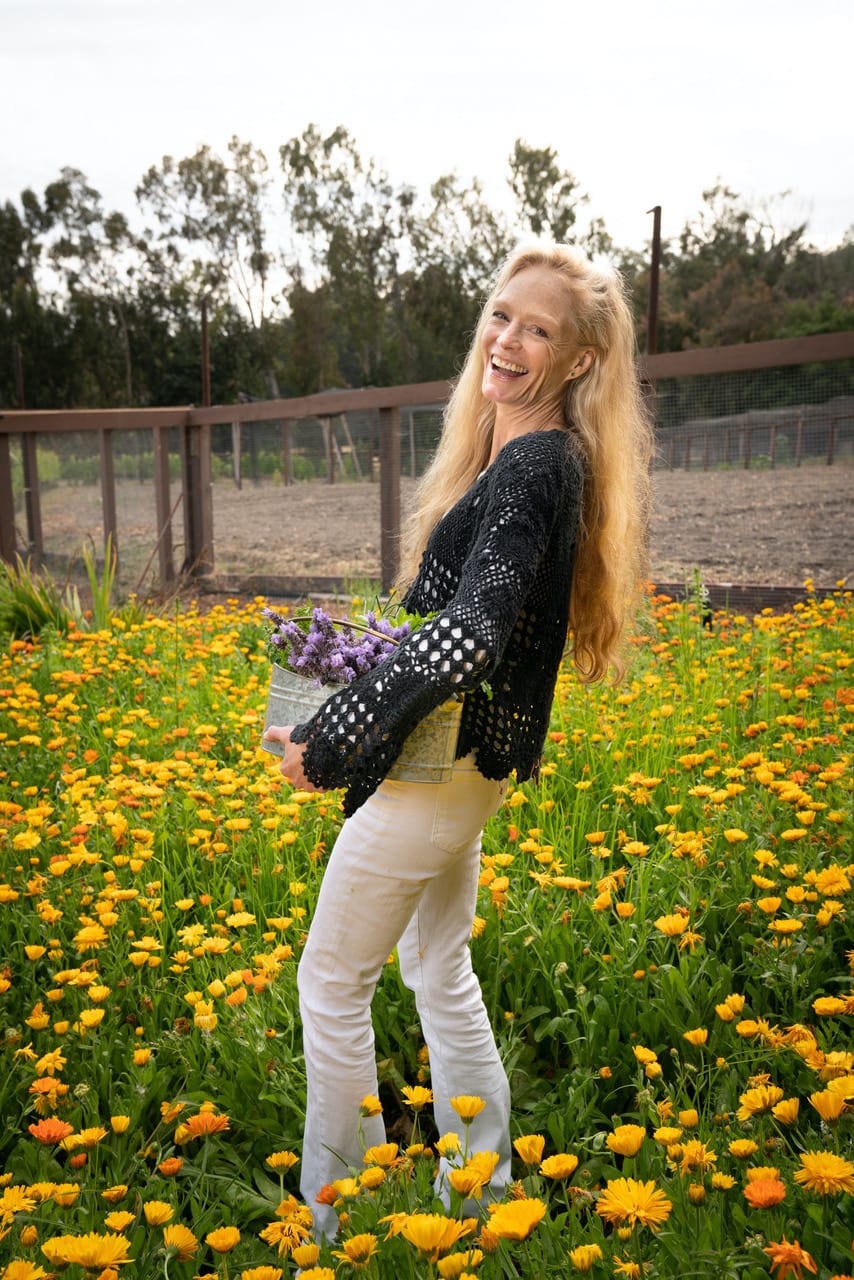“OMD is about changing One Meal a Day to a plant-based dish, and it is enough to make a huge difference to our water and carbon footprint, as well as our health,” says American environmental advocate, author and former actress Suzy Amis Cameron.
Who is Suzy Amis Cameron? Before becoming an environmental advocate and going plant-based, Suzy had a career working as a model and actress since the age of 17. She appeared in many movies including the award-winning Titanic with Director James Cameron. She soon fell in love with and later married James, and focused on raising their family of five children. In 2012, the Camerons decided to change their eating habits and become completely plant-based. With James and Suzy’s strong sustainable values, they believe it is impossible to identify as an environmentalist while eating meat. They are literally walking their talk and letting everyone know about it.
Meanwhile, Suzy and her sister Rebecca founded Muse School, now Muse Global School – Calabasas, which is the first school to become 100% solar powered, have zero waste, and have a 100% plant-based lunch program for the students. The school has now emerged into Muse Virtual, a K-12 online school which drew national and worldwide recognition for its innovative approach to education, fostering graduates who become bold leaders who are engaged with the world around them. Along with meeting the United Nations Sustainable Development Goals, they implement the three R’s: Recycle, Reduce and Reuse by growing their own food, composting, reducing water and producing their own energy. Muse Virtual reduces their carbon footprint while teaching the children how to help and not harm the planet. This school is the future. Suzy, leading the way with her plant-based movement, is the author of the book The OMD Plan, in which she invites her readers to swap “one meal a day” to save their health and save the planet. This book is a fun read and offers quick and easy steps to follow, including healthy meal swaps, recipes, shopping lists and more.
Monaco Life: What prompted you to start eating plant based?
Suzy Amis Cameron: On 6th May 2012, I watched Forks Over Knives, and it blew me away. I had a friend that had been plant-based and he had been telling me for about nine months: “You know Suzy, you’ve got to watch Forks Over Knives.” So, one day while I was on the treadmill I grabbed it and put it into the DVD player and after about 10 minutes I had to get off the treadmill. I was so gut punched that I had been lied to, and advertised to my whole life that we needed to eat meat to be strong and we needed milk to have strong bones. It’s completely the opposite of that. Once I finished watching it, I went up to the house to find Jim and told him we were going to watch a movie tomorrow. From the time we sat down with a couple of the kids, to the time the movie finished, we didn’t say a word. Afterwards, Jim said, “We shouldn’t have any more animal products in the house”.
The following day, the whole kitchen was completely cleaned out. That’s just how we roll.
So, what happened after you immediately decided that you were going to stop eating all dairy products and meat?
Then we decided that everybody else in the world needed to do the same thing. We really learned the hard way; we got up on our soap boxes and started preaching because we felt so great. We had so much energy and we had all the science behind it. Jim has cancer, heart disease and diabetes on his side of the family, and I do too. We wanted all of our loved ones to know about it. We made up gift bags with DVDs, books and vegan snacks and shipped them off to everyone. Well, it arrived like a bomb. No one wanted to hear about it. People thought we were crazy and that we were on to some weird California thing. People would see us coming and would want to turn around and run away because that’s all we wanted to talk about. We were like born again vegans.
Watching Forks Over Knives was a huge tipping point for Jim, but it also put me on this trajectory of my new purpose in life.
I had been working with the largest environmental NGO in the United States for about a decade and learned about the environmental issues, from dead zones to biodiversity loss, deforestation, ocean acidification, melting glaciers, I mean everything that you can ever imagine, but no one had ever said a word about animal agriculture.
It wasn’t until we had watched Forks Over Knives that Jim started giving me books, maybe two or three at a time, and talked to me about how devastating animal agriculture was on the environment.
How was going plant-based at Muse School received by the students and families?
Once we decided that we couldn’t call ourselves an environmental school and still be serving animal products, it took 18 months to educate the kids, teachers and parents on why we wanted to become a vegan school. We had a speaker series with a new speaker every month, either a doctor, a climate scientist, an athlete, an author or a chef, and they spent the day talking to the children about plant-based lifestyles in a developmentally appropriate way. In the evenings we would have adults and families come and offer them a glass of wine and beautiful plant-based meals. After 18 months, in the fall of 2015, we opened our doors and were 100% plant-based. We immediately lost 50% of our kids overnight. We thought we had done everything right.
Where did you get the name for your book, The OMD Plan?
One day, our head of school was very frustrated with the families and said: “You can give the kids what you want for breakfast and dinner, but at school it’s one meal a day. It’s OMD”. So that’s where OMD came from.
How did you manage to pull it together and what are you most proud of with this project?
The good story that comes out of that is we quickly regained our enrolment and we surpassed it and started having families move to the area from all over the United States and quite a few people from Europe.
Muse became the first plant-based School in North America and potentially worldwide because no one raised their hands and said they were first. That was a feather in our cap and also pushed us over the edge for something called the ‘Green Restaurant Award’. We beat the number one green restaurant by 600 points because we were solar powered, and the water and carbon footprint of being plant-based is so much lower than animal products, which became our pledge for OMD.
The whole premise of OMD is one person changing only one of their meals a day to a plant-based meal for one year saves two hundred thousand gallons of water and the carbon equivalent of driving from Los Angeles to New York (4,500 km), so the savings are astronomical if you think about it.
Meanwhile, 80% of all diseases are caused by the exploitation of animals. So, if we want to avoid pandemics in the future and stay healthy during pandemics, being plant-based is absolutely the way to go.
Now more than ever people are shifting to a new state of consciousness, and are aware of the fact that change is needed for the future of our planet. How do you feel about society’s consciousness of our planet since the outbreak of Covid-19?
We were only able to hypothesize what would happen to our planet if we took millions of cars off the roads and if we quit flying so much. Now suddenly we have seen fish in the Venice canals, Los Angeles’ air quality was the best in the United States during the lockdown, Beijing’s air cleared up. It gave us the window into “What if?”. Also, because pantry food lasts longer, more people were eating plant-based than they realised, by using tomato sauce or beans and rice.
Why was it important for OMD to suggest easy food swaps and nutritious recipes?
The beauty of OMD is it’s not about being perfect, it’s an invitation to dip your toe in and just give it a go.
You can try different recipes and there are so many easy swaps to do. For breakfast, you can use oat, soy or almond milk for your cereal or coffee instead of cow’s milk. For lunch, you can add tomato sauce to your pasta instead of a meat sauce. You can make a grilled bean and veggie burrito instead of a beef or chicken burrito. There are so many easy tricks you can do, and the book is full of ideas and recipes.
How did the students and children react to the shift to eating plant-based meals and practices like recycling?
We took the 18 months to transition and did it in a way where we used plant-based Meats, Garden chicken and we had Burger Day where we had Beyond burgers and things like that. Because it is an environmental school, there is a thread of sustainability that goes through absolutely everything that they do. The campus itself is sustainable. The paint is 0 v o c, the borders around the doors and the windows are made from recycled wood.
It’s 100% solar powered, our water usage is low, and we have zero waste. If you come on site with a single-use coffee cup you will probably have a child come up to you and say that doesn’t belong here. You will not find a single plastic bottle.
How many students are enrolled at Muse School?
We had about 230 students pre-Covid, starting from two years old all the way through to 18 years on two campuses. Because of Covid, we are now Muse virtual, and we have kids from around the world.
Tell us about some of the school programs.
We have a very robust seed to table program, so the children learn how to plant, grow, harvest, prepare and then compost. Some parents say: “My kid doesn’t eat anything green, so good luck”. But there’s this positive peer pressure thing going on. So, they show up kind of pale and their eyes are a little bit dead, but within a month into they’ve got rosy cheeks and they’re eating green beans off the vine. Kids will say “hey man, look at this carrot, isn’t it great?”, and some kids say, “I don’t like carrots”, but they encourage the others to try it.
We started getting calls from parents asking things like how to plant a raised bed garden, or how to compost. So, we created an entire program to teach parents how to do composting and put in gardens and how to cook plant-based meals. We still have an online cooking show that we do with our chef.
Parents are always concerned about making sure kids get enough protein. What can you say about that?
It comes up all the time. People ask if their child’s brain will develop properly, will they be getting enough protein. The bottom line is that there is a protein obsession around the world. People think that we need two, three or four times the amount of protein than we actually need.
If a child is eating a very colourful diet, then they are getting the right amount of protein. If they are eating lentils, beans and chickpeas and lots of grains, they’re getting enough protein. If a parent is nervous about it, they can make a smoothie and chuck some plant-based protein powder in it. Kids love smoothies. Now, there are many options. In 2012 when we went plant based, there were not that many options.
Now, a large part of my job is to create and change the supply chain and people’s consumer behaviour patterns. The plant-based industry is the largest growing sector in the food industry. In the last three years, it has grown astronomically by 250 per cent. Even the meat industry is investing in plant-based alternatives, and the dairy industry is investing in plant-based milks. It’s not a trend anymore, it’s the future of food.
The bottom line is we can not feed the planet and humankind with animals. It just won’t work with the amount of land and water that is needed to grow one pound of meat, which is about one acre of land.
We were able to calculate here on our farm that we can get one tonne of meat per year or we could get thirty tonnes of vegetables. It is the same amount of land but with a quarter of the water – a one to 30 ratio.
As the founder of the plant-based ventures Verdient Foods, Cameron Family Farms, Food Forest Organics and Plant Power Task Force, what can you tell us about animal agriculture and what it’s doing to our planet?
What people don’t realise is that animal agriculture is the leading cause of greenhouse gases and climate change, more than all transportation combined. It accounts for 14.5%, compared to 4% for jet travel
Animal agriculture is a huge problem, not only because are the animals suffering, but also our health.
After writing OMD and working with the brain trust of doctors that I was so grateful to be able to work with, I discovered that only about 4-5% of diseases are genetic. The rest of them are created by what you’re eating and lifestyle.
Colin Campbell’s 40-year research project called The China Study looked at what everybody was eating. Peasants were eating a plant-based diet because they couldn’t afford meat, and they were the healthiest in the country.
The people who lived in the affluent areas were the ones that had cancer, heart disease, diabetes and autoimmune issues.
They call it the affluent disease.
As you know, I am an animal advocate and I am concerned about species extinction, which brings me to my next question… What do you believe is the biggest reason for loss of biodiversity and species extinction?
Making room for animals/cows to graze and/or clearing spaces to grow corn and soy to feed the animals. It is mind-blowing how many forests are cleared to feed these animals. The Amazon is a perfect example. They clear massive amounts of rain forests to grow corn and soy, and 80% to 90% of it goes to feed animals. Imagine how many people that can be fed from this corn and soy?
It’s all about the burger. Biodiversity loss is the result of people’s taste buds, because we’ve been told our whole lives that we need meat and dairy, meanwhile they’re clear-cutting forests left and right and centre in the Amazon.
In your opinion, how can we motivate people collectively to make a change?
The OMD Plan invites people to change one meal a day, and to have flexibility by being able to just dip your toe in and try one plant-based meal a day. It’s an invitation into a whole new way of living and you don’t have to be perfect.
When I was on my book tour, people would say, “Don’t take away my burger away, don’t tell me what I can eat it”. People get very territorial because it’s comfort food, or tradition or cultural.
But when I started explaining that this is just changing one meal a day, all of a sudden everybody relaxed and started saying “ok that sounds easy, I can do that”. In my interview with Oprah, she said: “well that’s graspable, I can wrap my brain around that one”. Then people realise that after they’ve had a plant-based meal, they don’t fall into a food coma and have that mid-morning or afternoon dip, or they don’t have indigestion.
Typically, what happens is people will try one meal a day and then they’ll feel so great that they’ll transition to two meals a day.
So many people say, “I don’t know what I can do for climate change” or “there’s really nothing I can do as an individual.”
But with OMD, every time you put food on your plate, if it’s plant-based, you are helping your health and the environment. If you’re putting animal products on your plate, you’re hurting your health, the environment and the animals.
For more information:
https://omdfortheplanet.com
https://suzyamiscameron.com
https://www.musevirtualschool.com
Protecting biodiversity, one meal at a time


